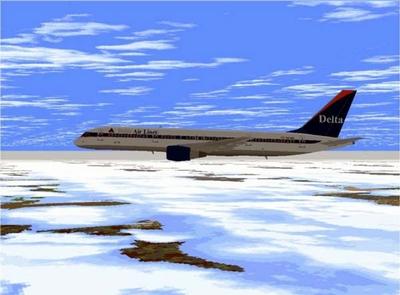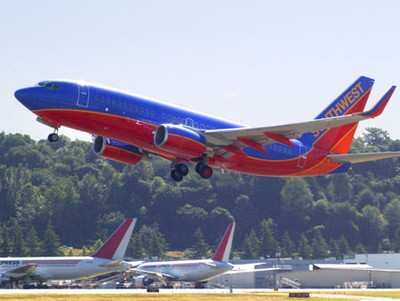AMR Defers Delivery Of 54 Boeing Aircraft
The financial situations at both American and Delta just aren't
getting any better. At Delta, a fourth quarter loss of $2.2 billion
made 2004 the airline's worst-ever. At American, continued losses
have forced the carrier to forego 54 of 56 aircraft ordered from
Boeing. The trickle-down economics of aviation have, for these
airlines, become torrents of red ink. And yet, through it all,
low-cost carrier Southwest continues to profit.

Delta Loses $5.2 Billion In '04
In spite of the ongoing efforts to trim costs through
negotiations with its various labor groups, Delta lost $5.2 billion
in 2004 -- but that number may be a little misleading. If you
exclude the costs of restructuring -- one time charges reflected in
the fourth quarter -- Delta lost $780 million in the last three
months of the year.
Still, fuel charges were up at least 68-percent from the year
before, as Delta paid an average $1.42/gallon for go-juice.

And yet...
Delta CEO Gerald Grinstein told employees this week that the
airline had "through the eye of the needle," according to the
Atlanta Journal-Constitution. "These numbers show clearly the
difficulties our airline will continue to face in 2005. At the same
time Delta made important progress toward our transformation
goals."

Grinstein (above) continued: "Though we still are not out of the
woods," management is making changes "to transform Delta into the
right airline for the new era."
American Defers Huge Boeing Order
 Those fast-rising fuel prices caused
problems industry-wide in 2004. AMR, the parent corporation of
American Airlines, cited the massive rise in fuel costs as the
major reason it lost $387 million in the fourth quarter. Fuel costs
for American were $1.1 billion more in 2004 than they were the year
before.
Those fast-rising fuel prices caused
problems industry-wide in 2004. AMR, the parent corporation of
American Airlines, cited the massive rise in fuel costs as the
major reason it lost $387 million in the fourth quarter. Fuel costs
for American were $1.1 billion more in 2004 than they were the year
before.
"As expected, the fourth quarter proved to be a disappointing
end to a very difficult year," said American CEO Gerard Arpey.
AMR's results for the fourth quarter of 2004 reflect the economic
woes that plagued the airline industry throughout 2004, in
particular, high fuel prices and a tough revenue environment."
Because of the continued loss in 2004, American now says it will
defer the purchase of 54 Boeing aircraft scheduled for delivery
between now and 2007. There was no immediate comment from
Boeing.

Like his counterpart at Delta, Arpey (above) did see a glimmer
of optimism in the fourth quarter numbers. "The issues we are
grappling with are not new to us, and in fact, in 2004 we made a
lot of headway in addressing them," he said. "The productivity of
our people, and of our fleet, is higher than it has ever been. We
are running a smarter, more efficient airline than we were a year
ago. We have improved our performance relative to the rest of the
industry on both the revenue and cost sides of the ledger."
Continental, Northwest Post Huge Losses
 The nation's fifth-largest airline,
Continental, which posted a $47 million profit in the fourth
quarter of 2003, showed a loss in the last quarter of $206
million.
The nation's fifth-largest airline,
Continental, which posted a $47 million profit in the fourth
quarter of 2003, showed a loss in the last quarter of $206
million.
 Northwest also posted a huge loss --
even bigger than American's -- at $402 million in Q4.
Northwest also posted a huge loss --
even bigger than American's -- at $402 million in Q4.
Meanwhile, At Love Field In Dallas...
Southwest Airlines says its net income for fourth quarter 2004
was $56 million.
The Company also reported its 32nd consecutive year of
profitability, with annual net income of $313 million, or $.38 per
diluted share, compared to 2003 net income of $442 million, or $.54
per diluted share. Excluding last year's government grant, 2003 net
income was $298 million, or $.36 per diluted share.

"I am very proud of our employees and their strenuous efforts to
lower our cost structure," said CEO Gary Kelly (below). "Although
our fourth quarter 2004 earnings declined 15.2 percent due to
significantly higher energy costs, our unit costs, excluding fuel,
declined 4.5 percent. As a result of our low cost competitive
advantage and ongoing efforts to improve productivity, we have been
able to offer the low fares our customers demand while sustaining
our profitability and growing our route system during these
difficult airline industry times."

The statement goes on, but, given what we read above, it would
be sort of like rubbing salt in the wound.
 NTSB Prelim: Lee Aviation LLC JA30 SuperStol
NTSB Prelim: Lee Aviation LLC JA30 SuperStol Classic Aero-TV: Curtiss Jenny Build Wows AirVenture Crowds
Classic Aero-TV: Curtiss Jenny Build Wows AirVenture Crowds ANN's Daily Aero-Term (05.30.25): Very High Frequency (VHF)
ANN's Daily Aero-Term (05.30.25): Very High Frequency (VHF) Aero-News: Quote of the Day (05.30.25)
Aero-News: Quote of the Day (05.30.25) Classic Aero-TV: Quest Kodiak Enhances Migration Monitoring Programs
Classic Aero-TV: Quest Kodiak Enhances Migration Monitoring Programs











